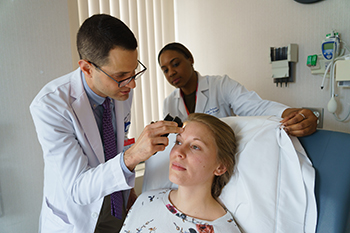Skin Cancer and Organ Transplants
Transplant Dermatology Multidisciplinary Clinic at BIDMC

The Transplant Dermatology Multidisciplinary Clinic brings you expert care to treat and prevent skin cancers that may occur after your transplant.
Schedule Your Appointment: 617-632-9700
Complete Care: One Location, One Visit
During your appointment, you will meet with skin and kidney specialists who will provide well-coordinated, complete care in one location.
First, a dermatologist (skin doctor) will review your health history to assess your skin cancer risk, and will provide a full skin exam. Biopsies can be performed on-site right away if any suspicious lesions are found.
Next, a nephrologist (kidney specialist) will review your anti-rejection medications, and may fine-tune your dosage or change your medications if necessary to limit your risk of skin cancer while keeping your transplanted kidney safe.
We can also arrange an appointment with a dermatologist if you have received an organ transplant other than a kidney (liver, pancreas, heart, lung, etc.), and care can be coordinated with your transplant doctors.
Meet Our Team

Jonathan Weiss, MD
Mohs and Dermatologic Surgery
Know Your Risks
You may have an even greater risk for skin cancer after an organ transplant if you have:
- Fair or easily burned skin
- Blue, green or hazel eyes
- Red or naturally blonde hair
- History of extensive outdoor sun exposure
- Extensive freckling
- History of tanning bed use
- A prior history of skin cancer
- A family history of skin cancer
Prevention is Key
Here are some things you can do to reduce your skin cancer risk:
- Limit outdoor activities between 10:00 am – 4:00 pm since this is when the sun is most intense.
- Wear broad-spectrum sunscreen with an SPF 30 or higher on a daily basis.
- Use SPF 50 or higher during outdoor activities.
- Reapply sunscreen at least every two hours when outdoors.
- Seek shade whenever possible.
- Wear a wide-brimmed hat and other sun-protective clothing.
- Avoid sun tanning or tanning bed use.
- Check your own skin once a month in front of the mirror for new or changing lesions.
